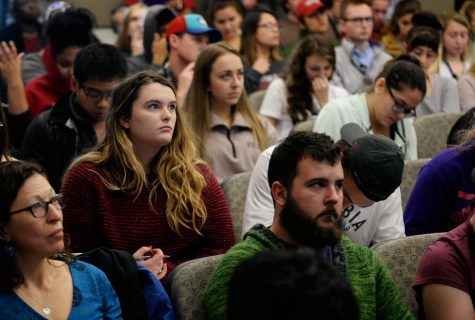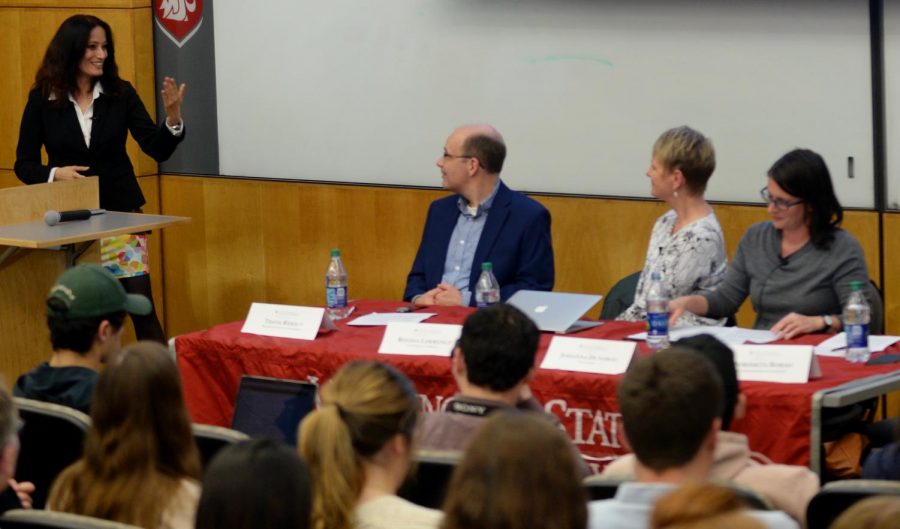Experts explain fake news at Foley Talk
Thanks to loss of public trust, social media has allowed fake stories, such as #pizzagate, to spread rapidly
MICHAEL LINDER | The Daily Evergreen
WSU Professor Porismita Borah, left, discussed how fake news spreads Tuesday.
October 25, 2017
Foley invites speakers to educate about Trump’s administration and their relationship with the news.
Fake news conspiracies, such as #pizzagate and the traditional media’s role in sorting through viral online information, were the topics of discussion by media experts at a Foley Talk on Tuesday.
Porismita Borah, associate professor in the Murrow College of Communication, said fake news is often spread on Twitter.
She said that in 1996, 20 percent of people in the U.S. got information online.
Borah then said that number grew to 81 percent in 2016. During the 2016 election, she said 62 percent of people in the U.S. got their information from only social media sources.
Additionally, Borah showed a slide that depicted numbers on how many people in 2016 engaged with mainstream news versus fake news.
She said the data she has seen shows that many people shared both mainstream and fake news stories, but more people reacted to the fake news stories.
“That becomes important if what is being spread is misinformation and what is actually real news,” Borah Said.
She talked in depth of her research with #pizzagate, an example of when misinformation was spread through Twitter.

Students listen to professor Prismita Borah talk about President Trump’s effect on the media Tuesday.
The slide that Borah showed was a blurred out picture of one of the twitter accounts that started #pizzagate, a widely spread conspiracy against former presidential candidate Hillary Clinton.
She said the online buzz over #pizzagate spiked November 2016, and many legitimate news outlets covered #pizzagate after the shooting.
Borah said that the research concluded with seeing a lot of misinformation being spread from bi-partisan sources.
She said that a lot of the big players responsible for #pizzagate are still on Twitter. Only one, she said, deleted their account.
Johanna Dunaway, associate professor at Texas A&M University, showed how the role of traditional media is changing because of social media.
“What we are seeing is both old and new, the difference between direct and mediated information, the media backdrop have recently changed,” she said.
She also spoke about the tense relationship between President Trump and the media.
“President Trump tends to use social media very heavily as a strategic communication tool,” Dunaway said, “also a lot of the tendency that those posts … are kind of increasingly negative.”
She said the press and the president have a mutual relationship. The press needs the president because he is a newsmaker, and the chief of staff and the president needs the press as a microphone, she said.
Dunaway said there always been a struggle over the control of information. She said that the press and the presidency are always adversarial.
“There’s always this tension struggling to control of information,” she said, “and the flow of information.”
Dunaway said that there is a difference between direct information and mediated information. The press needs to be objective, she said, versus the messages that politicians give out.
“Because it is a direct platform,” she said, “the person sending the message can design it to meet the branding or whatever tactic they want to achieve, but when the media tells stories of the president or other politicians, they filter it by being objective or by telling the other side of the story.”
Dunaway said that the media has changed through the hybridization of the media system we are operating in. The direct messages that the public has become familiar with, Dunaway said, is still the same, but the tools of journalism has changed.
“Obama was really well known early on for… [Revamping] the White House website,” she said, “that became the new platform for the weekly radio address.”
There is no doubt that Trump has had a background in entertainment, Dunaway said, but he and his team learned a lot from social media experiences. She said that played a large role in his campaign.
She said that not only does that play into how he won, but there was three crises: a crisis of politics, a crisis in journalism, and a crisis of public trust.
The crisis in politics was because of polarization in the political arena, a crisis in journalism because of how it is easy to fall into the trap of giving coverage to crazy politicians, and a crisis in public trust because of the steep decline in trust in media over the last couple of years, Dunaway said.
“It’s critically important to be able to use new media tools to attract the attention and coverage of the more traditional media,” she said.
Regina Lawrence, executive director of the Turnbull Portland center and Agora Journalism Center at University of Oregon, said that accountability can come from news outlets that have the resources and the journalists to do that type of journalism.
Lawrence said that the mainstream media is crucial for Trump, regardless of what he may want people to believe.
She said that it is hard for media to cover this president because he tweets more often than conventionally speaking.
“How do you cover a president that actively circulates fake news?” Lawrence said, “Who bends the truth and contradicts himself on an almost daily basis?”
She said that Trump is not dependent on persuading a majority of voters to accomplish his goals. The presumption is that when a president is elected, there has to be voters to back him up in order to accomplish what they want, Lawrence said.
Trump has flaunted the rules of presidency by the way he interacts with the media, she said.
“You can say that Trump has trumped the rulebook,” Lawrence said.
Correction: This article has been updated to correct inaccurate information. Fake news is spread on all sides of the political spectrum, not just by conservatives. No one died in the #pizzagate shooting in November 2016.















